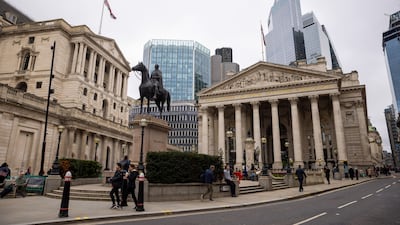The Bank of England has kept UK interest rates at a 16-year high of 5.25 per cent, despite evidence that inflation is slowing significantly and a move by its Swiss counterpart to start a cycle of cuts.
BoE governor Andrew Bailey said Britain's economy was "moving in the right direction" signalling a departure for a central bank that has now either increased or kept rates on hold at every meeting for the past four years.
The US Federal Reserve on Wednesday said it would probably cut rates three times before the end of the year and Mr Bailey, said it was "reasonable" that financial markets should take the view that cuts were in the offing this year.
"The signs we are seeing are encouraging," he said, addressing interest rate cuts. “We’ve had very encouraging and good news, so I think we can say we’re on the way.”
Which may point to something central bankers haven't felt in a long time - relief. They may now be thinking that the beast of inflation, which has stalked the world's developed economies for four years is showing some signs of being tamed, but not cowered.
As the world's major economies come to the end of 2024's first quarter could this be the moment to consider changing down a gear and at least think about reducing interest rates?
Switzerland has already done it. On Thursday, the Swiss National Bank (SNB) surprised many with a 0.25 per cent cut, which took the country's main interest rate to 1.5 per cent and boosted the stock market by around 0.9 per cent.
“The easing of our monetary policy has been made possible because the fight against inflation over the past two and a half years has been effective,” the departing SNB chairman Thomas Jordan said.
“This signals to the world that we have turned a corner,” Philipp Hildebrand, vice chairman at BlackRock and a former president of the SNB, told Bloomberg Television.
“Central banks are easing, and the question is, where does all this settle in the long term?”
Many economists now predict the first cut to UK interest rates in June. In Thursday's MPC meeting eight members voted to keep rates on hold, one voted to cut. At February's meeting two voted to raise rates, one to cut and six to keep them the same.
That sliver of dovishness was enough to boost shares in London, as the FTSE 100 gained more than 1.5 per cent. In New York, the Dow, the Nasdaq and the S&P 500 all continued their upward trend from Wednesday, pushing around 0.6 per cent higher on Thursday
On the currency markets, the pound to slide by 0.5 per cent to trade as low as $1.2726 against the dollar. Against the euro, it fell 0.23 per cent to 85.62 pence.
June cut?
Analysts said while the BoE has hinted at rate reductions later in the year, it may actually change tack and bring in a rate reduction earlier than anticipated, possibly at one of its next meetings.
"Our forecast that inflation will fall further and faster than the Bank expects suggest it will change its tune in the coming months," said Ruth Gregory, deputy chief UK economist at Capital Economics.
"That’s why we think a rate cut in June is possible and why we think rates will fall to 3 per cent in 2025 rather than to 3.75-4 per cent as priced into the market."
At Thursday's meeting, the MPC voted 8-1 to keep interest rates at 5.25 per cent. One member, Swati Dhingra, voted to reduce rates by 0.25 per cent.
At February's MPC meeting, two members, Jonathan Haskel and Catherine Mann, wanted to increase interest rates, but today voted to keep them on hold, indicating a slight softening of their more hawkish stance.
The pound fell against the euro and the dollar following the BoE's decision, as the prospects for a summer rate cut improved. Interest-rate futures showed traders are putting a 76 per cent chance the BoE will cut rates in June.
"If the shift in the dynamics on the committees is representative of the MPC as a whole, then we maintain our current view that the Bank of England will begin to cut rates in June," said Philip Shaw, chief economist at Investec.
Falling inflation
On Wednesday, figures from the Office for National Statistics (ONS) showed inflation in the UK fell to 3.4 per cent in February from 4 per cent the previous month, a larger drop than expected, but still above the BoE's target rate of 2 per cent.
However, many economists now forecast that when the price cap is reduced again on energy prices in April, the effect will be to push inflation below the BoE's target.
Since the February meeting, figures showed the UK's economy contracted by 0.3 per cent in December, meaning Britain entered a technical recession.
However, purchase manager data released on Thursday indicated the UK might have already exited that shallow recession.
"Further signs of the UK economy having pulled out of last year's brief recession are provided by the provisional PMI data for March," said Chris Williamson at S&P Global Market Intelligence.
The BoE's action on Thursday mirrored those of the US Federal Reserve the day before, which, while keeping interest rates steady for the fifth straight month, also signalled three cuts before the end of the year.
"Certainly the Fed’s message made it much easier for the BoE to shift its stance today, and all things being equal, I think we are almost in a position where when the Fed finally cuts, the BoE will likely immediately follow suit itself," said Stuart Cole, chief macro economist at Equiti Capital.


